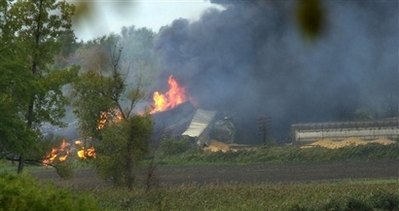4 Views
New Ethanol Danger May Spark Controversy
by
Robert Farago
(IC: employee)
Published: February 27th, 2008
Share
Rising food prices, sinking water tables, deforestation leading to increased CO2 levels, billions in taxpayer subsidies; what else could you possibly have against ethanol? How about this [via Yahoo! News]: "Ethanol fires are harder to put out than gasoline ones and require a special type of firefighting foam. Many fire departments around the country don't have the foam, don't have enough of it, or are not well-trained in how to apply it, firefighting experts say. It is also more expensive than conventional foam." Unlike many of the effects of America's rush to ethanol, this is a danger you can see. Have seen. "In the last three months of 2007, three major fires pointed up the danger. In western Pennsylvania, nine ethanol tanker cars derailed and triggered a blaze that tied up a busy rail line. In Missouri, a tanker truck carrying several thousand gallons of ethanol and gasoline crashed near the state Capitol, killing the driver. The flames spurred the evacuation of two elementary schools and forced the state to rebuild a badly damaged bridge. And in Ohio, a train heading through the northeastern part of the state to Buffalo, N.Y., derailed and burned, forcing more than 1,000 people from their homes." Now how much would you pay? [thanks to David Holzman for the link][TTAC interview with HAZMAT expert Jack Currie below]
Robert Farago
More by Robert Farago
Published February 27th, 2008 8:45 AM


































Comments
Join the conversation
So, we're in agreement then: More ethanol use, means more ethanol shipped around the country in tanker trucks and railway cars, since the ethanol cannot be shipped in existing pipelines. More ethanol travelling in trucks and railway cars means more accidents and more fires. Apart from the environmental damages, there is also the lives lost, personal injury, etc. etc. You argue that passenger vehicles running on E85 will have no higher fire danger that vehicles using normal gasoline. Nobody was saying otherwise. The point is that putting out the fire resulting from a few tanker cars derailing require more water than what is typically available. A 20,000 gal car would require more than 200,000 gal to put out the fire. Ask your local VFD about that one. If nine of these caught fire, as happened in Pennsylvania, you may need to shut down your city's water supply while trying to put this out. Assuming they even had access to 1.8 million gallons of water. The article points out that putting out fires from the said accidents would be harder to put out than gasoline fires. In addition, the article claims many fire departments don't have the right foams and experience to fight ethanol fires. You seem to dispute it, without providing any facts to the contrary. So, which part of the article did you have a (scientific or other) problem with, Mr. Stating-the-obvious?
"The point is that putting out the fire resulting from a few tanker cars derailing require more water than what is typically available. ... Ask your local VFD about that one." --Actually, I did. To be classed as an NFPA Class A fire department (Vol or paid) each pumper-type (not ladder, aerial or rescue) truck is required to have a minimum of 500 gal water and at least one truck has to have 30 gal of "foam concentrate" on board. That 30gal, when mixed with water becomes way more foam... Most trucks today carry at least 750gal, and my local suburban VFD now rolls one @ 1000g. "A 20,000 gal car would require more than 200,000 gal to put out the fire." -- Ummm, your math doesn't work. The original quotes cited about nine times as much water. That's 180k gal, so, umm, you know... "If nine of these caught fire, as happened in Pennsylvania, " --Not true, and you took the bait in the article, exactly as the author intended. Read the text exactly: "nine ethanol tanker cars derailed and triggered a blaze that tied up..." How many cars derailed: nine. Thank you. How many caught fire? Doesn't say, so at least one, but assuming all nine did is a false conclusion based on the data (not) provided. If you're sure it's nine, cite your reference(s) such a local news story. Yahoo and Wikipedia don't count. "you may need to shut down your city’s water supply while trying to put this out. Assuming they even had access to 1.8 million gallons of water." And your grandmother is still a shopping cart. The excess water (9:1) is if the foam isn't available; in these large cases, it would be. Enough already with the "may" and the "could". Or did you write the Yahoo article? My chat with the FD folks pointed out another interesting item, although only marginally related to the article. Consider a really big spill, say a split tank truck. The fuel runs out and lights off...is 8000 gallons burning? No!, or at least not always. It may have puddled and have a "thickness", but only the top layer is actually burning. Take any of the fire essentials (oxygen, heat, etc) off the top layer and you're there. A lot of the fuel will remain unburned as long as the nec. elements are kept away. "the article claims many fire departments don’t have the right foams and experience to fight ethanol fires. You seem to dispute it, without providing any facts to the contrary." --Last part tells it all, and you state my case exactly: the article provides no facts either. It makes CLAIMS without substantiation, percentages, references or citations. For example, How many fire companies DO have the training, and who gave you the information? How many companies are Class A (with foam cap'y)? How many exceed the minimum and have more than 1 foam maker?. There's no numbers here at all, and who are the experts referred to? My problem is NOT with the facts of fire fighting and chemistry, it's with vague reference in an article plainly designed to scare readers. I will say I'm surprised that your engineering training didn't better teach critical reading skills. Engineers usually live and die by facts and numbers. You may have the last word. I'm finished with this one. /jt
I'm a retired full time firefighter and a graduate of the National Fire Academy. Please stop I cant take it anymore my sides are splitting.